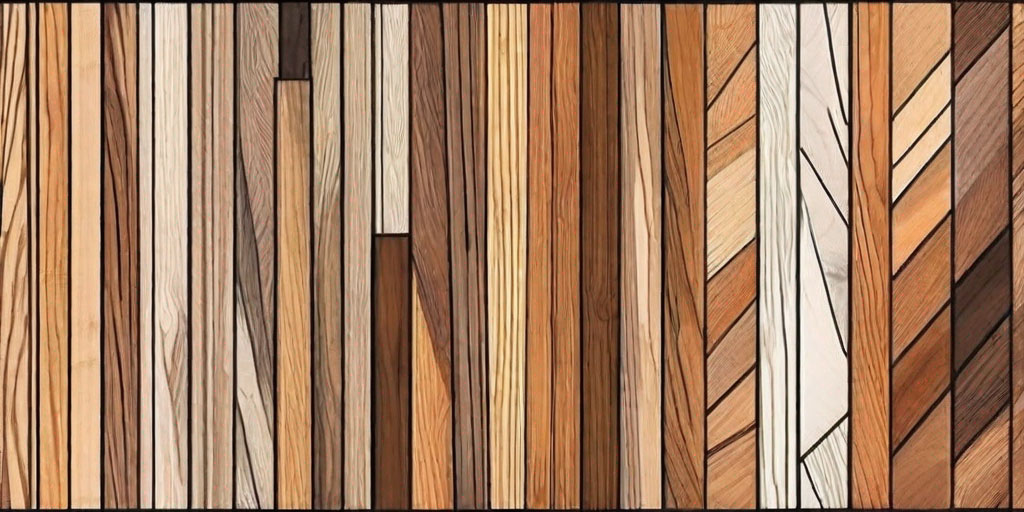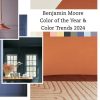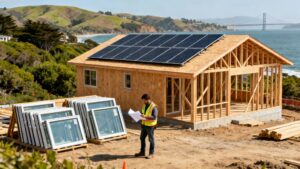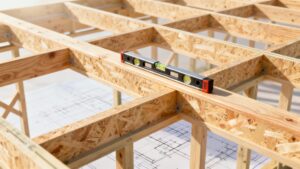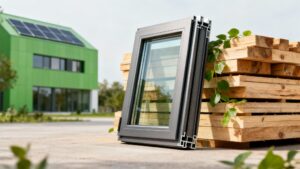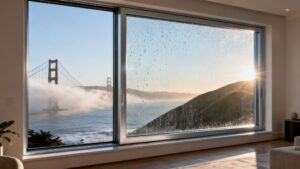A deck adds value and elegance to any home, providing a perfect outdoor space for relaxation and entertainment. When it comes to choosing the best hardwood for your deck, durability, beauty, and maintenance considerations are paramount.
In this article, we will explore the different aspects of hardwood decking, from the identification of the most durable hardwood for deck construction to maintaining the deck for long-term durability. We will also compare popular hardwoods, discuss cost considerations, and present the best options for hot and humid climates. So, let’s dive in!
Identifying the Best Hardwood for Decking Construction
When deciding on the best hardwood for your deck, durability should be a top priority. Hardwoods are known for their strength and ability to withstand the outdoor elements. However, some hardwoods outshine others in terms of longevity. One such hardwood is Ipe, also known as Brazilian Walnut. With its exceptional durability and resistance to rot, insects, and decay, Ipe is a popular choice for decking.
Ipe is a tropical hardwood that originates from South America. It is renowned for its incredible hardness, which makes it highly resistant to wear and tear. In fact, Ipe is so durable that it is often used in commercial applications such as boardwalks and bridges. Its natural resistance to moisture and UV rays also makes it an ideal choice for outdoor decking.
Not only is Ipe durable, but it also boasts a beautiful appearance. Its rich brown color with hints of red and amber adds warmth and elegance to any outdoor space. Over time, Ipe weathers to a silvery gray patina, further enhancing its natural beauty.
Another hardwood worth considering is Cumaru, also known as Brazilian Teak. Similar to Ipe, Cumaru is highly resistant to water damage and insects. Its natural oils and dense grain contribute to its durability, making it an excellent choice for deck construction.
Cumaru is native to Brazil and other parts of South America. It is known for its stunning golden-brown color, which deepens over time. The wood’s unique grain pattern adds character and visual interest to any deck. Like Ipe, Cumaru is a dense hardwood that can withstand heavy foot traffic and harsh weather conditions.
In addition to Ipe and Cumaru, Cedar and Redwood are also excellent options for durable deck construction. Cedar is a softwood that is naturally resistant to decay, rot, and insect damage. Its pleasant aroma and warm reddish-brown color make it a popular choice among homeowners. Redwood, on the other hand, is a hardwood that is naturally resistant to decay and splintering. It is known for its rich reddish-brown color and straight grain, which gives it a timeless appeal.
Both Cedar and Redwood are sourced from North America, making them more readily available in certain regions. They are also considered sustainable choices due to their relatively fast growth rates and the fact that they can be harvested from managed forests.
When choosing the most durable hardwood for your deck, it is important to consider factors such as climate, maintenance requirements, and personal preferences. Each hardwood mentioned – Ipe, Cumaru, Cedar, and Redwood – offers its own unique set of qualities and aesthetics. By carefully evaluating these factors, you can select the hardwood that best suits your needs and ensures a long-lasting, beautiful deck for years to come.
Exploring the Benefits of Hardwood Decks
Aside from durability, hardwood decks offer a range of benefits. With their natural beauty and rich colors, hardwoods create a timeless and elegant outdoor space. Moreover, hardwoods can be easily customized to match any architectural style, enhancing the overall aesthetic appeal of your home.
When it comes to hardwood decks, the possibilities are endless. Imagine stepping onto a deck made of stunning Brazilian Teak, with its deep reddish-brown hue that exudes warmth and sophistication. Or picture a deck crafted from Ipe, a dense and durable hardwood known for its deep brown color and resistance to rot and decay. With hardwoods, you have the freedom to choose the perfect material that reflects your personal style and complements your home’s exterior.
Exceptional Strength and Durability
But the benefits of hardwood decks go beyond their visual appeal. Hardwoods, such as Cumaru and Tigerwood, are renowned for their exceptional strength and durability. The dense composition and dimensional stability of these woods ensure a sturdy and secure deck that will withstand heavy foot traffic and outdoor activities. Whether you’re hosting a lively barbecue or enjoying a peaceful evening under the stars, you can trust that your hardwood deck will provide a reliable and long-lasting outdoor living space.
Hardwood decks require minimal maintenance compared to other decking materials. With regular cleaning and occasional sealing, your hardwood deck will maintain its beauty and structural integrity for years to come. Unlike softwoods or composite materials, hardwoods are naturally resistant to pests, rot, and decay, making them an excellent choice for outdoor environments.
Consider Sustainability
In addition to their durability and low maintenance, hardwood decks offer environmental benefits. Hardwood trees, when responsibly harvested, are a renewable resource. By choosing a hardwood deck, you are supporting sustainable forestry practices and reducing your carbon footprint. Furthermore, hardwoods have a natural ability to absorb and store carbon dioxide, contributing to the fight against climate change.
When it comes to the installation process, hardwood decks can be customized to fit any space and design. Whether you have a small backyard or a sprawling outdoor area, hardwoods can be cut and shaped to create the perfect deck that maximizes your available space. From intricate patterns to simple and clean lines, the versatility of hardwoods allows for endless design possibilities.
So, if you’re looking to create an outdoor space that combines beauty, durability, and environmental responsibility, hardwood decks are the perfect choice. With their natural elegance, structural integrity, and low maintenance requirements, hardwood decks will provide you with a stunning and long-lasting addition to your home.
Comparing Popular Hardwoods for Decking
Now, let’s compare some popular hardwoods for decking to help you make an informed decision:
- Ipe: Known for its extreme durability, Ipe is an excellent choice for homeowners seeking a long-lasting deck.
- Cumaru: This Brazilian Teak offers similar benefits to Ipe but comes at a slightly lower price point.
- Cedar: A more affordable option, cedar boasts natural insect resistance and decay resistance, making it an attractive choice for those on a budget.
- Redwood: Known for its beautiful color variations and natural resistance to rot and insects, redwood is a classic choice.
Each of these hardwoods has its own unique characteristics, so it’s important to consider your specific requirements and budget when making a decision.
Maintaining a Hardwood Deck for Long-Term Durability
To ensure the longevity of your hardwood deck, regular maintenance is essential. Here are some maintenance tips:
- Regularly sweep away debris and leaves to prevent mold and mildew growth.
- Apply a sealer or stain every few years to protect the wood from the effects of weathering.
- Avoid using metal shovels or sharp-edged tools that can scratch the surface. Instead, use a plastic shovel or a broom to clear snow.
- Keep furniture with rubber or plastic feet to prevent scratches.
- Arrange furniture and plants periodically to allow the deck to even out its exposure to sunlight.
By following these simple maintenance practices, you can extend the life of your hardwood deck and keep it looking beautiful for years to come.
Cost Considerations When Choosing a Hardwood Deck
While the choice of hardwood undoubtedly affects the cost of your deck, it’s important to weigh the upfront expenses against the long-term benefits. Hardwood decks may require a higher initial investment compared to other decking materials, but their durability and longevity often make them more cost-effective in the long run.
In addition, considering the potential increase in your property’s value and the enjoyment you’ll derive from a stunning hardwood deck, the investment becomes even more worthwhile.
Best Hardwoods for Hot and Humid Climates
Living in a hot and humid climate presents unique challenges for deck construction. Certain hardwoods are better suited for these conditions due to their resistance to moisture and heat. Here are some recommended options:
- Ipe: With its exceptional density and natural oils, Ipe excels in hot and humid climates.
- Cumaru: Brazilian Teak’s density and resistance to moisture make it an ideal choice for tropical areas.
- Garapa: Native to South America, Garapa offers excellent heat resistance and durability, making it a great option for hot climates.
These hardwoods can handle the intense sun, high humidity levels, and heavy rainfall that often come with hot and humid climates, while maintaining their strength and beauty.
Hardwood Decking: An Investment Worth Making
In conclusion, when it comes to finding the best hardwood for a deck, considering durability, beauty, and maintenance is crucial. Ipe, Cumaru, Cedar, and Redwood are among the popular choices, each with unique qualities and price points. Proper maintenance is key to ensuring the long-term durability of your hardwood deck.
While the upfront cost may be higher, the benefits of hardwood decking, both in terms of aesthetics and longevity, are worth the investment. So, choose the hardwood that suits your needs, and embark on the journey to creating a stunning outdoor space that will enhance your home for years to come.


